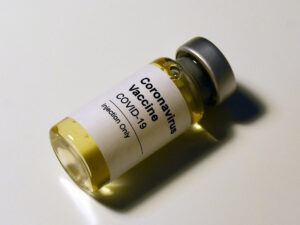Call to the Canadian government to take action on vaccine equity

A year into the global COVID-19 pandemic, it’s time to “use every tool” to ensure that people world-wide have access to vaccines, argues the head of the World Health Organization (WTO).
KAIROS has written to Prime Minister Justin Trudeau to encourage greater efforts toward fair global access to COVID vaccines. The letter makes three points:
- Canada should join efforts within the WTO for a waiver from patent protection rules. This initiative – intended to increase vaccine production and launched by South Africa and India, is supported by about 100 countries.
- Canada should also support efforts among the G20 nations and the International Monetary Fund (IMF) to release U.S. $3 trillion of global reserve funds (“Special Drawing Rights”) to support crisis response and recovery efforts in medium- and low-income countries.
- Here in Canada, governments should develop a plan to assure vaccines are made available to migrant workers and people who are undocumented, as called for by Canada’s Migrant Rights Network in its #VaccinesForAll campaign.
KAIROS encourage you to take action and write to your Member of Parliament, calling on them to raise these same issues with the Prime Minister and Ministers of Foreign Affairs, International Trade and International Development.
The global COVID pandemic and the struggle to distribute vaccines this year reveal and magnify fissures in Canada (in the treatment of, among others, seniors and migrant workers) and around the world (in protection of public health in countries already impoverished, and in their capacity to enable any eventual recovery).
The WTO and the patent waiver
KAIROS’ call on the Prime Minister to support efforts to ease patent protection on vaccines is drawn from decades-old ecumenical work to ensure that patents do not block access to life-saving medicines for people living with HIV-AIDS, malaria, tuberculosis and other illnesses.
Under an international agreement enforced by the WTO that sets out minimum standards in relation to intellectual property, a government has the right to introduce compulsory licensing to allow generic production of the same substance, but that government needs to muster the political will to challenge the big pharmaceutical companies. Complexity increases when a country without its own production capacity wishes to import a generic product from a country (such as India) that can produce it. Most of the vaccines becoming available now were developed by large pharmaceutical companies and produced after heavy infusions of public subsidies, and yet the companies are holding tight to their patents and preventing generic production, despite urgent need worldwide. Patent rules should not be an obstacle to public health.
On February 26, the head of the World Health Organization, Tedros Adhanom Ghebreyesus argued that more needs to be done.
“I understand full well that all governments have an obligation to protect their own people. But the best way to do that is by suppressing the virus everywhere at the same time,” said Ghebreyesus. “Now is the time to use every tool to scale up production, including licensing and technology transfer, and where necessary, intellectual property waivers. If not now, then when?”
Given that Canada is not yet among the countries supporting the waivers, KAIROS encourages you to sign the following petition to the House of Commons in support of the proposal:
We, the undersigned, people of Canada, call upon the Government of Canada to support the proposal from India and South Africa for a waiver from certain provisions of the TRIPS Agreement for the prevention, containment and treatment of COVID-19 at the WTO TRIPS Council without delay.
The IMF and global reserve funds
The KAIROS call for global reserve funds to support pandemic response and recovery efforts emerges from the same circle of Jubilee-related groups world-wide that have worked together for decades to ease the constraints of foreign debt and to build a global finance system that works for everyone.
More than 215 such groups sent an open letter on February 24 to the Group of Twenty (G20) Finance Ministers, which includes Canada, and the IMF calling for a quick allocation of global reserve funds (“Special Drawing Rights”, SDRs) to support coronavirus crisis response and recovery efforts in low- and medium-income countries.
“A multilateral solution is needed. One that will not push low- and middle-income economies into further debt distress,” the letter states.
“To that end, we ask that you urgently support a new allocation of IMF SDRs in the amount of U.S. $3 trillion. We believe that an allocation of this size is required to address the real needs in a decisive and sustainable way.”
In a letter sent in November, KAIROS called on Finance Minister Chrystia Freeland to speak up for debt cancellation. The letter was part of a global campaign to draw attention to debt as an obstacle to effective responses to the COVID pandemic.
Migrant workers and people who are undocumented in Canada
KAIROS’ call to ensure that all migrants in Canada have accesses to vaccines emerges from ongoing work to protect the rights of foreign temporary workers in Canada. The Migrant Rights Network says that federal and provincial governments should ensure full access to the COVID-19 vaccines to all migrants regardless of their status. Please visit the Vaccines For All petition.
KAIROS supports the rights of migrants in Canada and around the world. Current priorities include increasing pressure towards ratification and implementation of international conventions that protect migrants and domestic workers, along with fair and dignified immigration policy, and the development of temporary foreign worker programs based on fair labour standards and inclusive of comprehensive monitoring.
There is an urgent need for vaccines equity and justice. COVID-19 has exposed and magnified inequities and vulnerabilities within Canada and around the world. Critically vulnerable populations continue to face barriers to access, distribution, and administration of vaccines. Canada can and must do more.
By Jim Hodgson



